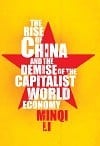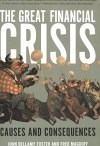Political Economy
In the face of continuing right-wing attacks on Social Security since the Reagan era in the 1980s, MR has responded repeatedly by pointing to the phony nature of the Social Security crisis. Two articles of note are Jacob Morris, “Social Security: The Phony Crisis” in the February 1983 issue of MR and “Social Security, the Stock Market, and the Elections” in the October 2000 issue. Those wanting a thorough historical understanding of this struggle are encouraged to look back at these articles. Given the nature of the right-wing onslaught, which all along has pretended that the Social Security trust fund was threatened with “bankruptcy,” MR’s chief thrust has been to dispel such misconceptions. Our primary purpose has been to counter what has been one of the major propaganda campaigns of our time. If Social Security is in peril of “collapse” it is only because of current plans to privatize it. However, there is a great danger in this controversy of getting drawn into endless debates on the financing of the Social Security system in the United States, while losing sight of the more fundamental issues | more…
The twentieth century’s dominant myth was that of a “rational capitalism.” The two economists who did the most to promote this idea were John Maynard Keynes and Joseph Schumpeter. Both were responding to the great historical crisis of capitalism manifested in the First World War, the Great Depression, and the Second World War. In the wake of the greatest set of horrors the world had ever seen, accompanied also by the rise of an alternative, contending system in the Soviet Union, it was necessary for capitalism following the Second World War to reestablish itself ideologically as well as materially. In terms of the ideological requirement, the two economists who accomplished this most effectively were Keynes and Schumpeter—not simply because they epitomized the best in bourgeois economic ideology, but also because they were the leading representatives of bourgeois economic science. What they set out in their analyses were the requirements of a rational capitalism and at least the hope that these requirements would be achieved | more…
Ed Cray, Ramblin’ Man: The Life and Times of Woody Guthrie (New York: W. W. Norton, 2004), 488 pages, cloth $29.95.
Ed Cray’s new biography of Woody Guthrie marks another step in a growing interest in the left-wing Okie troubadour. In 1997, historian Charles J. Shindo published Dust Bowl Migrants in the American Imagination, which includes analysis of Woody Guthrie’s work along with that of John Ford and John Steinbeck. Joe Klein’s enthusiastic biography of Guthrie, first published in 1980, was reissued in 1999, the year after Ed Cray began the new biography. Elizabeth Partridge’s book for young readers, This Land Was Made for You and Me: The Life and Songs of Woody Guthrie was published in 2002 | more…

In recent years, China has become a major actor in the global economy, making a remarkable switch from a planned and egalitarian socialism to a simultaneously wide-open and tightly controlled market economy. Against the establishment wisdom, Minqi Li argues in this provocative and startling book that far from strengthening capitalism, China’s full integration into the world capitalist system will, in fact and in the not too distant future, bring about its demise. | more…
The battle over the future of Social Security, the site of continual skirmishes since the Reagan era, is now being waged in earnest (for a history of this struggle see The Editors, “Social Security, the Stock Market, and the Elections,” Monthly Review, October 2000; see also, “Social Seceurity: The Phony Crisis” by Jacob Morris). President Bush began his second term by declaring that partial privatization of Social Security through the creation of personal investment accounts was at the top of the domestic agenda of his administration. This would require an estimated $2 trillion in additional borrowing over the next ten years, and even more after that (New York Times, January 3, 2005), to be coupled with drastic cuts in future Social Security benefits. The White House is counting on the Republican majority in both houses of Congress, the backing of Wall Street, and years of unrelenting ideological warfare against Social Security as the bases on which to effect this change | more…
The Muslims, as the Nation of Islam is called, stress the futility of the integrationist program. They argue that there is no precedent for the absorption of Negroes into the greater white American mainstream in fact or in history, that integrationists are asking for something the American socioeconomic system is inherently unable to give them—mass class mobility, so that at best Negroes can expect from the integrationist program a hopeless entry into the lowest levels of a working class already disenfranchised by automation | more…
David Gilbert, No Surrender: Writings from an Anti-Imperialist Political Prisoner (Montreal: Abraham Guillen Press, 2004), 283 pages, paper $15.00.
David Gilbert is serving a seventy-five year to life prison sentence for his participation in the 1981 holdup of a Brinks armored truck in which three persons were killed, two police officers and a security guard. The attempted robbery was an effort to raise money for the Black Liberation Army (BLA), an underground offshoot of the Black Panther Party. By the time of the Brinks events, David had been a committed revolutionary for nearly twenty years. In 1965 he founded the Committee Against the War in Vietnam while a student at Columbia University; he was a founding member of the Columbia chapter of Students for a Democratic Society (SDS) in 1967; he was a leader of the famous student strike at Columbia in 1968; and he was an early member of the Weathermen faction of SDS in 1969, whose members soon went underground to wage war against U.S. imperialism and racism, renaming themselves the Weather Underground. They hoped to support all those around the world actually fighting against U.S. imperialism and even to ignite a popular uprising in the United States through a series of spectacular bombings of government facilities (including the Pentagon) and corporate offices and banks, as well as by written propaganda and analysis | more…
An essential aspect of any modern democratic society is a communications system that enables rather than disables public debate. Yet the mass media in the advanced capitalist societies are highly concentrated, controlled by a few owners (on the extent of this control in the United States and its implications see Robert W. McChesney, The Problem of the Media [Monthly Review Press, 2004]). Further, the United States has witnessed the emergence of what is undoubtedly the most sophisticated propaganda system ever developed, making it possible for control of the media to translate into the power to sway large parts of the society. An understanding of this problem is crucial if one is to grasp the changes occurring in U.S. society today: from war to privatization to the suppression of human rights | more…
The United States is facing the prospect of a major defeat in Iraq that is likely to constitute a serious setback in the ongoing campaign to expand the American empire. Behind the pervasive war propaganda as evidenced in the “victorious” attack on Fallujah lies the reality of a U.S. war machine that is fighting a futile battle against growing guerrilla forces, with little chance for a stable political solution to the conflict that could possibly meet U.S. imperial objectives. Nevertheless, the U.S. ruling class, though not unaware of the dangers, is currently convinced that it has no choice but to “stay the course”-a slogan adopted by both political parties and accepted by virtually the entire economic, political, military, and communications establishment. The reason for this seemingly irrational determination to stick it out at all costs can only be understood through an analysis of the logic and limits of capitalist empire | more…

The bursting of the housing bubble and the ensuing financial debacle have left most people, including many economists and financial experts asking: Why did this happen? If they had been reading Monthly Review, and were familiar with such articles as “The Household Debt Bubble,” “The Explosion of Debt and Speculation,” and “The Financialization of Capitalism,” they would not have needed to ask. In their new book, The Great Financial Crisis: Causes and Consequences, Monthly Review editor John Bellamy Foster and long-time Monthly Review contributor, Fred Magdoff, update this analysis, exploring the whole course of what is now known as “the worst financial crisis since the Great Depression”: from the debt explosion and housing bubble to the subprime debacle and federal bailout. They argue that this latest financial crash, although greater than any since 1929, is itself a symptom of deeper problems connected to the stagnation of the “real” or productive economy of mature capitalism. Financial bubbles have become the chief means of countering stagnation, but these inevitably burst, bringing the underlying economic problems back to the surface. The only recourse of the system: new and bigger bubbles, leading, as they too pop, to still greater financial crises and worsening conditions of production—in what has now become a vicious cycle. | more…
“A new age of barbarism is upon us.” These were the opening words of an editorial in the September 20, 2004, issue of Business Week clearly designed to stoke the flames of anti-terrorist hysteria. Pointing to the murder of schoolchildren in Russia, women and children killed on buses in Israel, the beheading of American, Turkish, and Nepalese workers in Iraq, and the killing of hundreds on a Spanish commuter train and hundreds more in Bali, Business Week declared: “America, Europe, Israel, Egypt, Pakistan, and governments everywhere are under attack by Islamic extremists. These terrorists have but one demand—the destruction of modern secular society.” Western civilization was portrayed as standing in opposition to the barbarians, who desire to destroy what is assumed to be the pinnacle of social evolution. | more…
Even in the United States, some aspects of life are too precious, intimate or corruptible to entrust to the market. We prohibit selling kidneys and buying wives, judges, and children | more…

